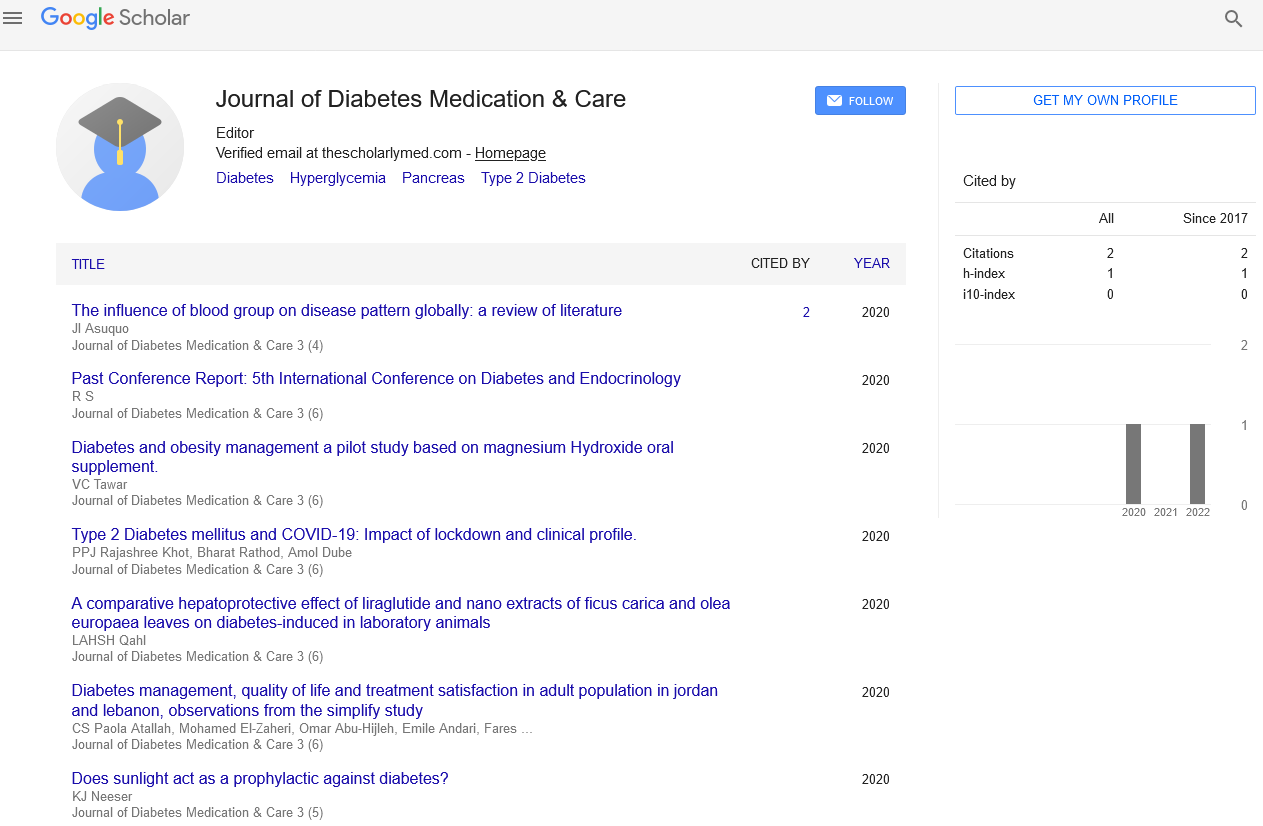Perspective - Journal of Diabetes Medication & Care (2023) Volume 6, Issue 6
Navigating the Maze: The Crucial Role of Medication Adherence in Managing Diabetes
- Corresponding Author:
- Lexi Charles
Department of Diabetes and Research, El Cocuy Unversity, Gutierrez, Colombia
E-mail: Lex@gmail.com
Received: 06-Nov-2023, Manuscript No. jdmc-23-122605; Editor assigned: 09-Nov-2023, PreQC No. jdmc-23-122605 (PQ); Reviewed: 23-Nov-2023, QC No. jdmc-23-122605; Revised: 07-Dec-2023, Manuscript No. jdmc-23-122605 (R); Published: 15-Dec-2023, DOI: 10.37532/jdmc.2023.6(6).154-155
Introduction
In the intricate landscape of diabetes management, medication adherence emerges as a critical factor influencing the overall well-being of individuals grappling with this chronic condition. Diabetes, characterized by elevated blood sugar levels, demands a multifaceted approach, with medication playing a pivotal role. However, the effectiveness of prescribed treatments hinges largely on the patient’s adherence to their medication regimen. This article explores the complexities surrounding diabetes medication adherence, delving into the reasons behind non-compliance, the repercussions on health outcomes, and innovative strategies to enhance adherence.
Description
Understanding diabetes and the importance of medication
Diabetes, a metabolic disorder, manifests in two primary forms: Type 1 and type 2. In both cases, the body’s ability to regulate blood sugar is compromised, necessitating the use of medications to achieve glycemic control. These medications may include insulin, oral hypoglycemic agents, and other adjunctive therapies. The goal of diabetes management is to maintain blood glucose levels within a target range to prevent complications such as cardiovascular diseases, kidney failure, and neuropathy.
Nonetheless, the efficacy of these medications is contingent on the patient’s adherence to the prescribed regimen. Poor medication adherence can result in suboptimal glycemic control, leading to an increased risk of complications and hospitalizations. Understanding the factors that contribute to non-compliance is crucial in developing tailored interventions to improve adherence rates.
Factors influencing medication adherence
Complexity of regimen: Diabetes management often requires a combination of medications, dietary changes, and lifestyle modifications. The complexity of the regimen can overwhelm some individuals, making it challenging to adhere consistently.
Fear of side effects: Many diabetes medications come with potential side effects, ranging from mild discomfort to severe complications. Fear of these side effects may deter patients from taking their medications as prescribed.
Financial barriers: The cost of diabetes medications and related supplies can pose a significant financial burden. Inaccessible or unaffordable medications may lead to non-adherence, particularly among socioeconomically disadvantaged populations.
Lack of education: Inadequate understanding of diabetes, its complications, and the importance of medication adherence can contribute to non-compliance. Patients need comprehensive education to empower them in managing their condition effectively.
Psychosocial factors: Emotional and psychological factors, such as stress, depression, and anxiety, can impact a person’s motivation and ability to adhere to their medication regimen. Addressing these factors is crucial for comprehensive diabetes care.
Consequences of poor medication adherence: The ramifications of inadequate medication adherence in diabetes management are far-reaching and can significantly compromise an individual’s health. Increased blood sugar levels resulting from non-compliance can lead to acute complications like hyperglycemia and ketoacidosis. Moreover, the long-term consequences may include the progression of cardiovascular diseases, vision impairment, nerve damage, and kidney dysfunction.
Healthcare systems also bear the brunt of non-adherence through increased hospitalizations, emergency room visits, and escalated healthcare costs. Recognizing the interconnectedness of individual and societal health underscores the urgency of developing effective strategies to enhance medication adherence.
Innovative approaches to improve medication adherence
Digital health solutions: Leveraging technology, such as mobile applications and smart devices, can assist individuals in managing their diabetes and adhering to medication regimens. These tools can provide medication reminders, track blood glucose levels, and offer educational resources, fostering a more comprehensive and patient-centric approach to care.
Personalized medicine: Tailoring treatment plans based on individual needs, preferences, and lifestyle factors can enhance medication adherence. Collaborative decision-making between healthcare providers and patients ensures that the prescribed regimen aligns with the patient’s goals and capabilities.
Behavioral interventions: Behavioral interventions, including cognitive-behavioral therapy and motivational interviewing, can address psychosocial barriers to adherence. By identifying and addressing emotional factors, healthcare providers can empower patients to overcome obstacles and commit to their treatment plans.
Community engagement: Establishing community support networks and educational programs can foster a sense of belonging and shared responsibility. Peer support, group activities, and community resources contribute to a supportive environment that encourages medication adherence.
Simplified medication regimens: Streamlining medication regimens by minimizing complexity and frequency of dosages can enhance adherence. Simplified regimens reduce the cognitive load on patients and increase the likelihood of consistent medication intake.
Conclusion
Diabetes management is a dynamic journey that requires a collaborative effort between healthcare providers, patients, and the broader community. Medication adherence stands as a cornerstone in this endeavor, influencing the trajectory of the disease and its impact on individual and public health. Understanding the multifaceted nature of non-compliance is the first step toward implementing targeted interventions that address the root causes.
As we navigate the maze of diabetes management, embracing innovative approaches and fostering a supportive ecosystem can pave the way for improved medication adherence. By empowering individuals to take control of their health and promoting a holistic understanding of diabetes care, we can strive towards a future where the complications of this chronic condition are mitigated, and the quality of life for those affected is significantly enhanced.

